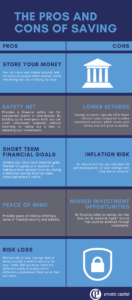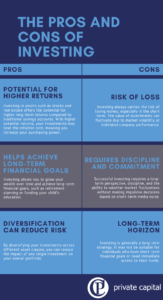Table of Contents
We often find these terms used interchangeably, and most people think these phrases are the same thing however, they represent distinct strategies with their benefits and considerations. Both strategies help build up wealth however, they represent putting money away for different reasons. We delve deeper to find the similarities and differences to find the most suitable for you.
How is saving and investing similar?
Savings and investing have one common goal, to build up wealth. Both use a specialised account which helps accumulate your money. Savings are through a bank account or a building society whilst investing is through an investment account, with an independent broker.
It is worth noting the costs per account. As there are usually no costs associated with a general bank account to accumulate savings, there may be costs regarding credit cards, loans, and debit interest rates. When opening an investment account with an independent broker, platform fees may be associated with investing.
Costs when saving or investing can decrease your value, therefore losing your purchasing power. This means the value of your money in the future may not buy the same amount of goods in today’s terms, i.e. Inflation.
Check out the last post here which talks about the different investing costs. Read more to find out how you can protect yourself from the eroding value of money.
How to Save
To begin your savings journey, it’s essential to develop a budget. A budget helps you allocate your income towards essential expenses, savings, and investments. By tracking your income and expenses, you can identify areas where you can reduce spending, and create a budget surplus. This in turn may show you could increase your investment contributions.
Budgets can track your personal inflation rate, which may reveal you may have to increase or decrease your investment contributions to keep in line with your current budgeting strategy.
I highly recommend this free spreadsheet here, which helps track your weekly, monthly and yearly spending. Or if you are a nerd like me, Toshl is a paid service which links to your bank accounts for automatic transaction inputs.
How are saving and investing different?
A common conception of savings is any surplus income after your expenses. As cash will be in your financial account, investments are different. What you hold within an investment account is different. Investing involves putting your money to work in various financial instruments with the expectation of generating a return or profit over time.
Unlike saving, investing carries a higher degree of risk but also offers the potential for higher returns. Investments can include stocks, bonds, mutual funds, exchange-traded funds (ETFs), real estate, and more.
Importance of Investing
Investing is essential for achieving long-term financial goals, such as retirement planning, funding your children’s education, or building wealth over time.
By investing, you have the opportunity to grow your money at a rate that exceeds inflation, potentially providing a hedge against it. Investing also allows you to take advantage of compounding returns, where your earnings generate additional earnings over time.
Stay tuned for more posts about the importance of investing and different asset classes.
How to Invest
When it comes to investing, it’s crucial to develop a well-thought-out investment strategy that aligns with your financial goals, risk tolerance, and time horizon. Diversification is key to managing risk and maximising potential returns. By spreading your investments across different asset classes, industries, and geographic regions, you can reduce the impact of any single investment on your overall portfolio. More information can be found in a previous article here.
For most investors, a long-term perspective is recommended. Trying to time the market or chase short-term gains can be risky and lead to poor investment decisions. Instead, consider adopting a passive investment approach, such as investing in low-cost index funds or ETFs that track broad market indexes.
These investments provide exposure to a diversified portfolio of stocks or bonds, reducing the risk associated with individual securities.
Watch this space for more posts on deeper dives into how to invest and the intricacies of the investment world.
The Pros and Cons of Saving and Investment

Did you know?
Savings held at banks or building societies are protected up to a certain level, in different jurisdictions:
- HK – HKDPB (Hong Kong Deposit Protection Board), limit is HK$500,000 per depositor per scheme member.
- UK – FSCS (Financial Services Compensation Scheme), up to £85,000.
- USA– FDIC (Federal Deposit Insurance Corporation), up to at least US$250,000.
This means if you have any savings held at a bank above these minimums, you may be at risk.

The Importance of Professional Advice
Investing can be complex, and it’s often helpful to seek guidance from a financial advisor or investment professional. They can help you assess your financial situation, develop a personalised investment strategy, and provide ongoing guidance and support. A financial advisor can also help you navigate the complexities of the investment landscape, ensuring that your investments align with your goals and risk tolerance.
Common Ground
It’s important to note that saving and investing are not mutually exclusive strategies. A well-rounded financial plan often incorporates both approaches. Whilst savings may be beneficial to your short-term goals, remember the only thing you can control when investing is time.
When you keep your investments for longer, you allow yourself more time to ride the ups and downs of the markets. That means investing when you can, for example, monthly contributions into an investment account can give you more time to expose yourself to compound interest.
Remember, the key to financial success lies in thoughtful planning, disciplined saving, and informed investing.
Stay tuned for my upcoming post on stocks vs bonds and the difference between indirect and direct investments.


